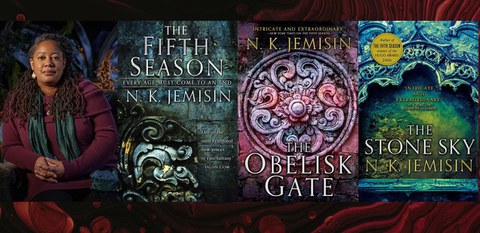11.03.2024
A Broken Earth: Posthuman Entanglements of Bodies, Knowledge and Matter in Postcolonial Speculative Fiction | Vortrag von Julia Gatermann | International Conference for the Fantastic in the Arts: Whimsy | 13.-16. März | Orlando, Florida
A Broken Earth: Posthuman Entanglements of Bodies, Knowledge and Matter in Postcolonial Speculative Fiction
Julia Gatermann at the International Conference for the Fantastic in the Arts: "Whimsy"
March 13-16, 2024
Orlando, Florida
As a result of unbound extractivist colonial practices, the world in N. K. Jemisin’s Broken Earth trilogy is quite literally torn apart: In a series of cataclysmic seismic events, the large continent, ironically named The Stillness, is ripped open into a never healing wound, spurting lava, poisonous gases and ash clouds, bringing on a Fifth Season – a period of permanent night and winter that is hostile to most life on the planet. In Jemisin’s novels, the deep entanglement of humans and environment, of animal and plant life with inorganic matter, takes center stage. So-called orogenes, genetically engineered humans with the ability to sense, connect to, and manipulate geological forces – the filigree web of vibrations that suffuses all matter - are powerful and strictly controlled instruments of the Fulcrum, the governing body at the center of this world’s hierarchical power structure. Feared in majoritarian society, and dehumanized accordingly, orogenes occupy a status of ‘less-than-human’, but it is exactly this hybrid posthuman embodiment, their ‘becoming-with’ non-human – even inorganic – others that ultimately allows them to not only break from the shackles of slavery but to forge a new, more sustainable bond with the planet itself, a sentient and intelligent entity on whose benevolence all life on its surface depends.
In my paper, I analyze the biopolitics of Jemisin’s orogenes – the novels’ marginalized Others – first along the lines Foucault’s concept of biopower and then move beyond such a purely discursive approach towards a more ontological perspective. Jemisin’s foregrounding of the need for drastic, visceral, and sometimes almost unbearably painful transformations calls up Stacy Alaimo’s de-anthropocentric notions of material agency and transcorporeality in which “the human is always intermeshed with the more-than-human world” (Alaimo 2) and Jane Bennett’s “vibrant matter” that is so deeply interconnected that “to harm one section of the web may very well be to harm oneself” (Bennett 13). From a critical posthumanist, new materialist, and ecofeminist perspective, Jemisin’s novels, I argue, critically observe how the racialized bodies of society’s Other – here the orogenes – are culturally marked as ultimately expendable and exploitable. But by emphasizing their material embodiment that is deeply entangled with the vital, vibrant, and intelligent non-human matter of the planet, she plots a way forward towards a hopeful vision of more ethical and egalitarian relationships, both with each other and with the environment – a way of thinking that requires a radical decentering of the human.
Bibliography:
- Agamben, Giorgio. Homo Sacer, Sovereign Power and Bare Life. Stanford University Press, 1998.
- Alaimo, Stacy. Bodily Natures: Science, Environment, and the Material Self. Bloomington: Indiana UP, 2010.
- Barad, Karen. Meeting the Universe Halfway: Quantum Physics and the Entanglement of Matter and Meaning. Durham: Duke UP, 2007.
- Bennett, Jane. Vibrant Matter: A Political Ecology of Things. Durham and London: Duke University Press, 2010.
- Braidotti, Rosi. The Posthuman. Cambridge: Polity, 2003.
- Butler, Judith. Bodies That Matter: On the Discursive Limits of Sex. Routledge, 1993.
- Foucault, Michel. Discipline and Punish: The Birth of the Prison. Translated by Alan Sheridan, Vintage, 1977.
- Haraway, Donna J. "A Manifesto for Cyborgs: Science, Technology, and Socialist Feminism in the Last Quarter." Socialist Review 80 (March/April 1985): 65 – 107.
- —. Staying with the Trouble: Making Kin in the Chthulucene. Duke University Press, 2016.
- Vint, Sherryl. Bodies of Tomorrow. Toronto: University of Toronto Press, 2007.

